type
status
slug
summary
tags
category
icon
password
ID
date
Author
URL
Let's talk about the e-book market in China and why Kindle and other E-Ink Reader are never really popular in China.
OK, I admit that the title is a bit exaggerated. Due to the lack of specific data, Kindle may still be the most popular E-Ink reader in the Chinese market.
HOWEVER, unlike the European and American markets, E-Ink reader has never become the mainstream of the Chinese e-book market. E-books made by moving ordinary books into the digital screens are not even the main players in the market.
About China’s e-book market, let’s talk about Kindle, WeChat Read, Web novel and second-hand books.
Let’s talk about Kindle first. Although there are no clear figures, the Kindle market in China is shrinking.
Its hardware sales are still large and its user base is still growing, but its market share seems to be shrinking. This is a result of many changes.
First of all, in terms of hardware, Kindle is facing severe challenges. If you are an E-Ink Reader maniac, you may have heard that a Chinese brand called Onyx Boox is producing e-readers with better performance than Kindle.
An important problem with Boox in foreign countries is that it doesn’t have a built-in book store, which means even if you buy a Boox reader, you still need to install a Kindle app on it to get most of the books. This makes most foreign consumers less convinced that the brand can challenge Kindle.
Amazon’s e-book store in China looks good, but not good enough. It lacks the Chinese favorite Web Novel, which makes it lack the motivation to grow. Boox’s reader can install different e-bookstores App, including those web novel app, which allows Boox users to consume more content than Kindle users.
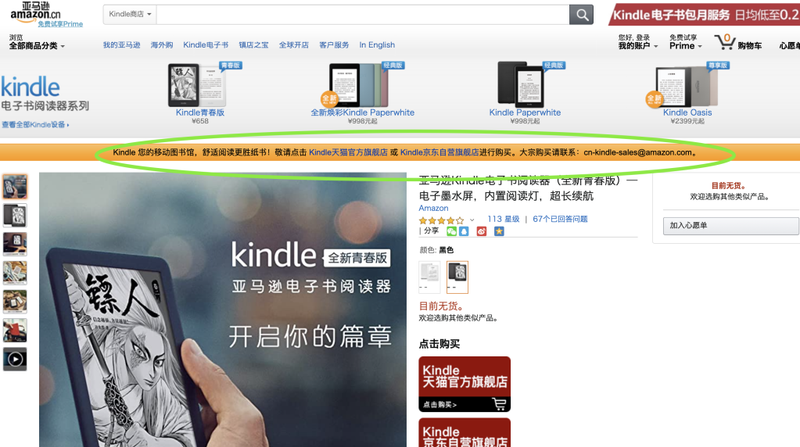
Amazon stopped its domestic e-commerce business in China in April 2019, and users can only buy imported goods on Amazon China. On Amazon China’s Kindle page, it says: please go to Tmall or jd.com Buy a Kindle.
Although Amazon China has never stopped selling the Kindle, and Kindle’s China bookstore also constantly releases new e-books, this sense of crisis has still forced some users to flee the Kindle and turn to other local e-readers. Amazon has repeatedly stressed that it will not let the Kindle business leave China, but the departure of its e-commerce business has made many Chinese consumers consider other options.
In addition, although Chinese consumption has improved, buying an e-reader alone is not worth it for most Chinese consumers. Because the device is still expensive. Books in China generally cost about 50 yuan (about $7.75), while a Kindle Paperwhite 4 costs 998 yuan (about $154.72) in China.
This means that if you use the money to buy Kindle, you can buy 20 books in China, which is more than many Chinese read in four years. According to official Chinese data, Chinese people read an average of 4.65 books in 2019.
Kindle also offers App, for Android and iPhone in China, but to be honest, the user experience is much worse than WeChat Read’s, which we’ll mention in another section.
Amazon mentioned in 2018 that sales of the Kindle in China have been growing by more than 10 percent a year since it officially started selling the product in China. But there are no updated data on whether this growth rate has slowed in recent years.
WeChat Read which grows rapidly and then enters the bottleneck period
WeChat Read is a reading app launched by Chinese social giant Tencent in 2015. It has quickly become one of the most important players in China’s e-publishing market in the past six years.
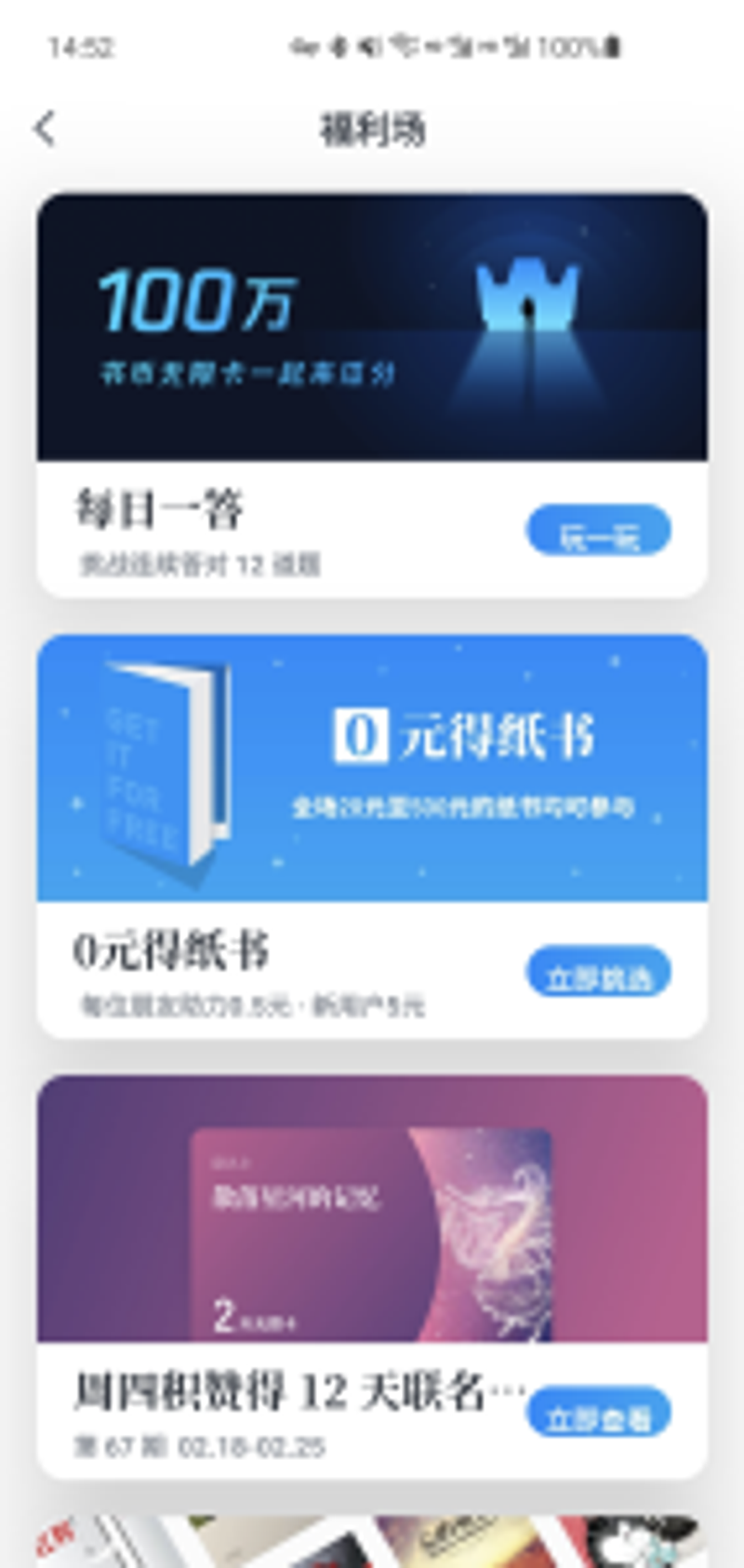
On a page called “Welfare Show”, WeChat Read offers 12 kinds of Mini Game, through which you will get free e-books, free value-added services or free physical books.
The success of WeChat Read is the success of the product experience, which is completely different from other reading software on the market. It uses a social, fragmented, and gaming way to motivate users to open it and read it deeply every day.
I will not introduce the basic functions of buying books and reading. I will talk about some of the differences between it and Kindle.
The first is gamification. Because WeChat Read comes from Tencent’s WeChat department, it can directly show your friends on WeChat. On WeChat Read, you can see the books your friends are reading, the books they have already read, and the amount of time they read each week.
Although these features can be turned off in privacy settings, it is clear that most people do not do so. So shortly after the launch of WeChat Read, there was a reading competition to see who reads the longest week and who reads more upper-class books.
The second is socialization. Wechat Reader has designed a series of functions that cause viral marketing. For example, users can get the opportunity to read books for free by sharing books with three other friends. You can also get Kindle Unlimited-like services(in Wechat, this is called Unlimited Card) for free by inviting friends to answer knowledge contests together. All the questions come from some book, and if you answer them wrong, they will recommend the book to you.
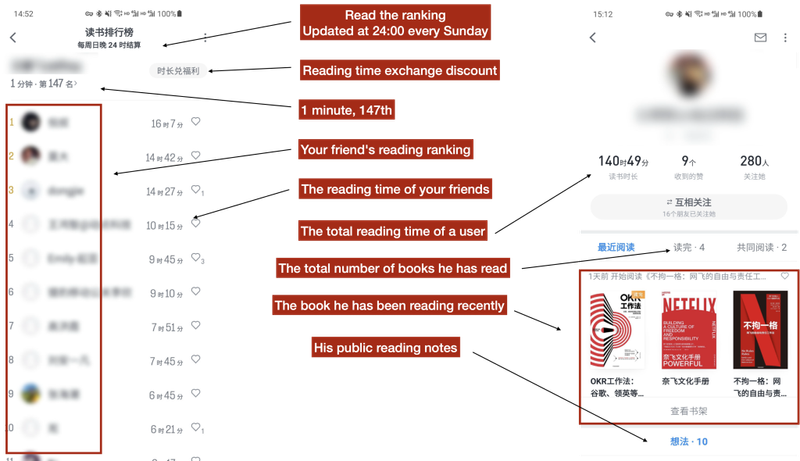
Finally, there is fragmentation. The platform has a built-in page similar to Facebook Feed, where users can see many passages and chapters extracted from the book for free. WeChat Read picks these paragraphs based on highlight data generated by readers on it. These contents are incomplete but very attractive. This greatly improves the chances for users to buy books and start reading.
The above innovative functions that Kindle does not have become an important reason for the success of WeChat Read in China.
WeChat Read released its first E-Ink reader before the Chinese New year in 2021. It has a 6-inch E-Ink screen, 1500mAh battery, WiFI, and Bluetooth 5.0 support, and the operating system is a modified “Wechat Reader system” based on Android 10. It was rumored that it was manufactured by Boox, and its price is 1499 yuan (about US $232), which is significantly higher than that of its competitors.
According to an interview in September 2020, WeChat Read has 210 million registered users and more than 5 million daily active users. 60% of users are between the ages of 19 and 35, and 80% have a bachelor’s degree or above. According to my subjective perception of China’s e-reading market, this figure should exceed Kindle E-Ink Reader and Kindle App in China combined.
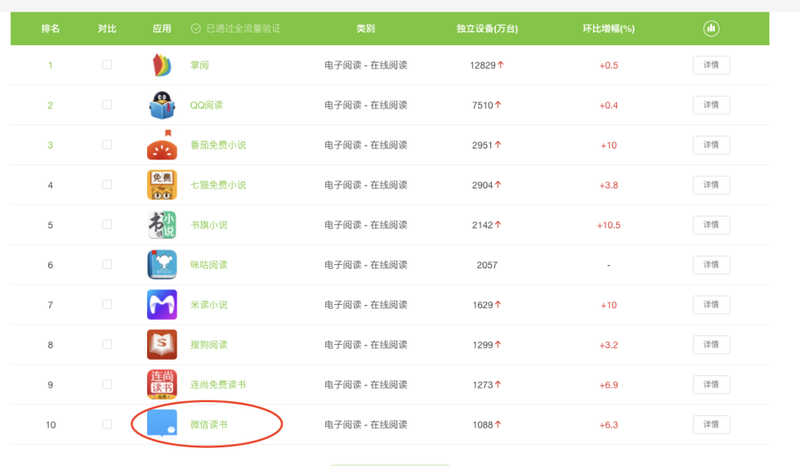
But if you have some common sense about China’s Internet industry, you will know that this figure is not perfect. It has been ranked 10th in China’s e-reading App rankings for the past three years, according to iResearch, a Chinese research firm.
You can see that there is no Kindle in the top 10 of this list.
Web Novel
At the top of the list is iReader, China’s largest independent Web Novel publisher. In January 2021, it is thought to have 128 million monthly active users.
Web Novel is a special literary form unique to China, which was born in the 1990s and is almost the same age as the civil Internet in China.
The web novel in China is similar to Japanese comics or light novels, except that it is updated almost daily and will be serialized all the time. You can hardly call it an “e-book”, because as long as it is popular enough, it will almost never end, so it will not form a “book”. Some well-known works will continuously update the latest chapters every day for 10 years.
Web Novel readers need to open app every day to get the latest chapters of the work. This makes users open web novel app far more often than e-books to read App.
You are reading Panda!Yoo
A blog about modern Chinese culture and consumption trends. If you are interested in Chinese food, drinks, games, movies, novels, dramas, please follow us.
Join 1,565 other subscribers
Some reading apps, built around classic books, such as Kindle and WeChat Read, do not handle the updated mode of web novels very well. So, Web Novel readers usually use other App.
There are two main players in the web novel market in China, one is iReader (掌阅), the other is China Literature (阅文), but the related business of Bytedance is also growing rapidly.
China Literature holds multiple products, such as QQ Read (which has 7500 monthly active users), Qidian, and WebNovel. At the same time, because Tencent owns part of the company, you can also read some works from China Literature in WeChat Read.
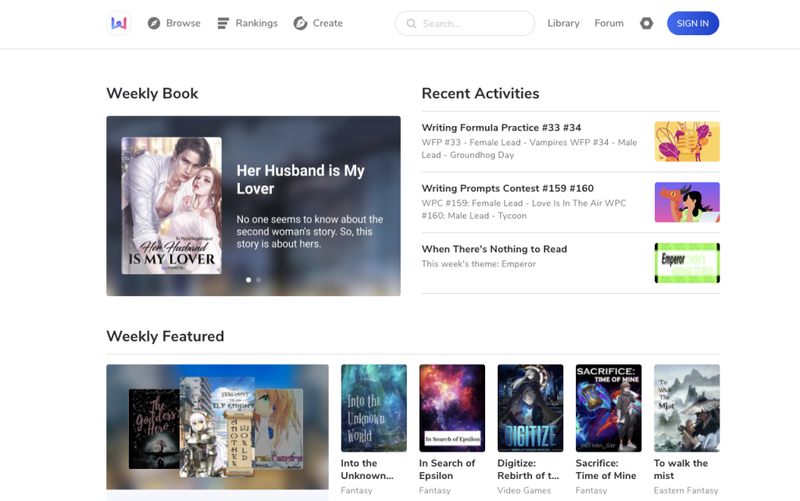
China Literature’s overseas web novel site.
You may have noticed that China Literature’s overseas product name is “WebNovel”, but that doesn’t mean all web novel comes from China Literature. It’s like Facebook calls its instant messaging product “Messenger”, but not all Messenger comes from Facebook.
iReader is China Literature’s main competitor, gaining more than 100 million monthly active users from a single App alone. Its success is mainly due to the pre-installation of Android phones in China. With the exception of Xiaomi, almost all Android phones in China are pre-installed with iReader when they leave the factory.
In these phones, iReader is directly displayed as a “novel” or “reader” on the home screen, which makes most users with low digital literacy directly use iReader as their reading tool.
TikTok’s parent company, Bytedance, launched its web novel product Tomato Free Fiction(番茄免费小说) in April 2019, which currently ranks third among e-readers in China, with 29.51 million monthly active users. As its name implies, the product allows users to read all web novels, for free, but it inserts ads in the middle of free content like Youtube.
The counterattack of physical books
China’s Internet industry has been very advanced in many areas, such as the number of mobile payment users in China is several times higher than the number of credit card users. But in the field of reading, Chinese still prefer physical books to e-books.
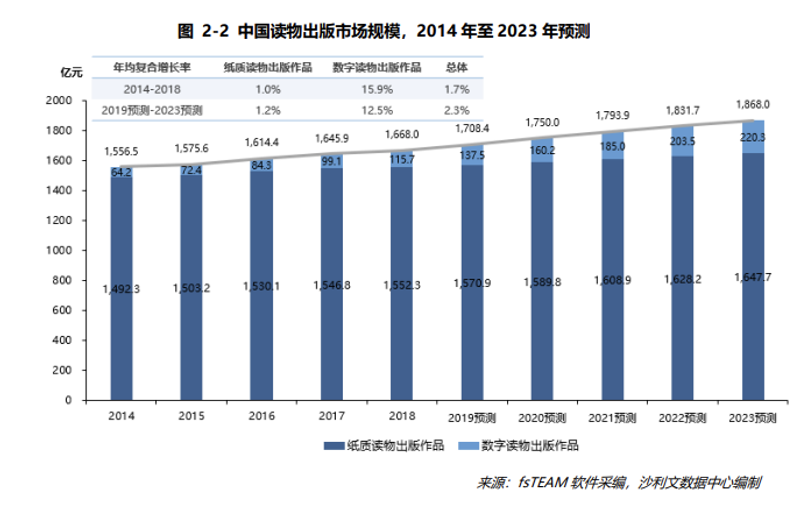
A chart by Frost & Sullivan China shows the size of China’s publishing industry from 2014 to 2018 and forecasts for 2019 to 2023. The light blue part is published for e-books, and the dark blue part is published for physical books. Even if I don’t translate it completely, you can see the gap.
According to the report, the average YoY growth rate of China’s e-book market was 15.9% from 2014 to 2018, wich was much higher than the 1% growth rate of the physical book market in the same period. However by the end of 2018, the e-book market was still less than 10% of the overall publishing market.
In the field of physical books, the Internet has also brought some changes.

Duozhuayu’s Logo is a cat with a fish face. Its English name seems to Deja-vu, but because it has no English business, the name appears only as part of logo. Its slogan is “a really good book that deserves to be read twice”.
A new unicorn company, Duozhuayu (多抓鱼, meaning “catch more fish”), which has annual sales of more than 100 million yuan(About 15.49 million dollars), was founded in 2017 and focuses on the recycling and sale of second-hand books.
Unlike eBay’s C2C(Consumer to Consumer) second-hand trading, it uses the C2B2C( Consumer to Business to Consumer) model.
After users sign up for Duozhuayu, they can sell physical books they no longer need to the company, which will give a valuation based on the original pricing of the books and their current durability.
After recycling a large number of used books, Duozhuayu will renovate those books, including removing bookmarks from the pages, removing notes and highlights from the books as much as possible, sterilizing the books, and cleaning the covers of the books with special reagents.
Duozhuayu will set different prices according to the quality of the book after it has been renovated and sell it in its own online mall.

Duozhuayu’s second-hand book warehouse
The advantage of this model is obvious, it greatly reduces transaction costs. Before Duozhuayu, it was inefficient for users to sell second-hand books on platforms like e-bay, because a used book might not be sold for a long time after it was released as a second-hand product. On the other hand, consumers are reluctant to check the second-hand market first when they decide to buy a book. They don’t know when the second-hand books they want will appear on the market, they need to keep searching to prevent them from missing their targets, which is really inconvenient.
Users don’t have to wait for a deal to sell books on Duozhuayu because the company acts as a distributor. At the same time, the company offers a reminder service, and when a book is sold out, you can book a reminder. When Duozhuayu successfully collects the book from the market and completes the renovation, it will remind you to buy it via Wechat.
To some extent, the emergence of Duozhuayu has curbed the development of reading Apps such as WeChat Read and Kindle.
Because in China, readers are significantly divided into two large groups: one kind of readers regards reading as a kind of entertainment, they only read novels like Twilight, Fifty Shades of Grey, and the fairy stories of oriental mysticism that you may have heard of. This kind of novel usually exists in the form of web novels in China. People will read it on iReader or QQ Read, and they will never buy E-Ink Reader. Because the cost of an E-Ink Reader can usually read this kind of novel for two years under the subscription system.
Another major group of readers in China mainly read “real books” (all non-Web Novel books), and these readers still focus on buying physical books as their main reading habit. Because physical books are easier to mark, take notes and collect. And when selecting physical books in bookstores, they can preview the general content of books while e-books cannot.
Such readers are the main potential users of Kindle, WeChat Read, and E-Ink Reader. In the past decade, the biggest incentive for them to give up physical books and start reading e-books is that e-books offer better prices. Due to the operating pressure of publishers, China’s e-books experienced a large-scale price increase in 2016. Shortly after that, Duozhuayu was born. It makes physical books cheaper than e-books, which weakens people’s willingness to read serious books on any app.
These are some of the changes that have taken place in China’s e-book market in recent years. If you have more curiosity about this topic, you can communicate with me on Twitter.
- Author:NotionNext
- URL:https://pandayoo.com/2021/02/22/why-is-kindle-no-longer-popular-in-china
- Copyright:All articles in this blog, except for special statements, adopt BY-NC-SA agreement. Please indicate the source!